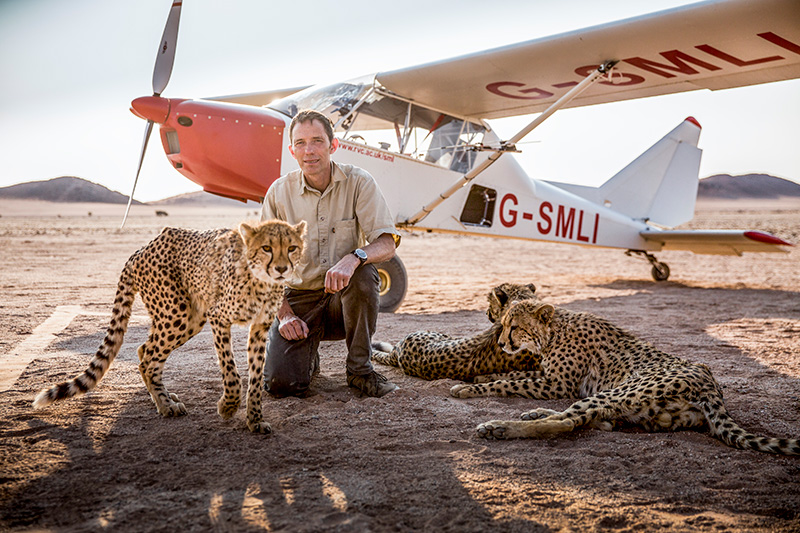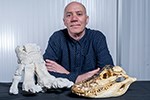Flying high: Professor at the Royal Veterinary College elected as Fellow of prestigious Royal Society
Professor Alan Wilson FRS of the Royal Veterinary College (RVC), has been elected a Fellow of the Royal Society, for his outstanding contributions to science.
Alan joins an exclusive group of veterinarians to be awarded FRS and is the only member of staff from the RVC to be granted this honour in the modern era.
The Royal Society is a self-governing fellowship made up of eminent scientists, engineers and technologists who are elected for life through a peer review process based on a substantial contribution to science and the improvement of natural knowledge.

Professor Wilson’s work has seen him cross the globe, examining the performance of sport animals during competition, wild African animals during hunting, and the energetics of bird flight. His work is primarily focused on how the musculoskeletal system of athletic animals is configured and used to deliver economical and high-performance locomotion, and the biomechanical factors that limit locomotor performance. His commitment to research also led him to build an aeroplane in his garden, obtain a pilot’s license, and spend a decade developing his own tracking collars so that he was able to fly across Botswana and monitor cheetahs in the wild.
His election to the world's oldest independent scientific academy reflects the pioneering results of his work and is testament to the significant number of papers he has published over the years. His research has been featured in a number of BBC documentaries, including BBC Horizon "The Secret Life of the Cat" and BBC 1's "Big Cats" series, both of which used his tracking and movement sensing collars to understand hunting and ranging behaviour to determine what makes the cheetah such an incredible predator.
Professor Wilson began his veterinary career as an undergraduate at The University of Glasgow, before undertaking a PhD in the Anatomy Department at The University of Bristol where he studied the mechanical basis of tendon injury.
In 1996, he joined the RVC where he now holds the post of Professor of Locomotor Biomechanics.
Professor Alan Wilson of the RVC, said: “This is a very great honour for me. Research is a team effort and I thank each and every member of my research team over the years for their contribution.”
Professor Stuart Reid, Principal of the RVC, said: “I am delighted for Alan, for his discipline and for the profession. Having been a classmate of Alan’s in our student days, now as a colleague, it is a particular pleasure to see him recognised for his significant contributions.”
Professor Jonathan Elliott, Vice Principal for Research and Innovation at the RVC, said: “Alan’s curiosity as to what limits locomotor performance in animals has driven his career. His ingenuity, with the help of his team, in devising ways to make the necessary measurements in nature to satisfy that curiosity in a scientifically robust way has been the key to his success. “We are immensely proud to have been able to support his work, recognition of which is richly deserved.”
Venki Ramakrishnan, President of the Royal Society, said: “At this time of global crisis, the importance of scientific thinking, and the medicines, technologies and insights it delivers, has never been clearer. Our Fellows and Foreign Members are central to the mission of the Royal Society, to use science for the benefit of humanity.
“While election to the Fellowship is a recognition of exceptional individual contributions to the sciences, it is also a network of expertise that can be drawn on to address issues of societal, and global significance. This year’s Fellows and Foreign Members have helped shape the 21st century through their work at the cutting-edge of fields from human genomics, to climate science and machine learning.
“It gives me great pleasure to celebrate these achievements, and those yet to come, and welcome them into the ranks of the Royal Society.”
Notes to Editors
For more information please contact:
- Jasmin De Vivo (Jasmin.DeVivo@plmr.co.uk)
- Press Line: 0800 368 9520
About the RVC
- The Royal Veterinary College (RVC) is the UK's largest and longest established independent veterinary school and is a Member Institution of the University of London.
- It was the first in the world to hold full accreditation from AVMA, EAEVE, RCVS and AVBC.
- The RVC is the top veterinary school in the UK and Europe, and ranked as the world’s second highest veterinary school in the QS World University Rankings by subject, 2020.
- The RVC offers undergraduate and postgraduate programmes in veterinary medicine, veterinary nursing and biological sciences.
- In 2017, the RVC received a Gold award from the Teaching Excellence Framework (TEF) – the highest rating a university can receive.
- A research led institution with 79% of its research rated as internationally excellent or world class in the Research Excellence Framework 2014.
- The RVC provides animal owners and the veterinary profession with access to expert veterinary care and advice through its teaching hospitals and first opinion practices in London and Hertfordshire.
You may also be interested in:
-
RVC’s Professor John Hutchinson elected Fellow of prestigious Royal Society
John Hutchinson, Professor of Evolutionary Biomechanics at the Royal Veterinary College (RVC), has …

